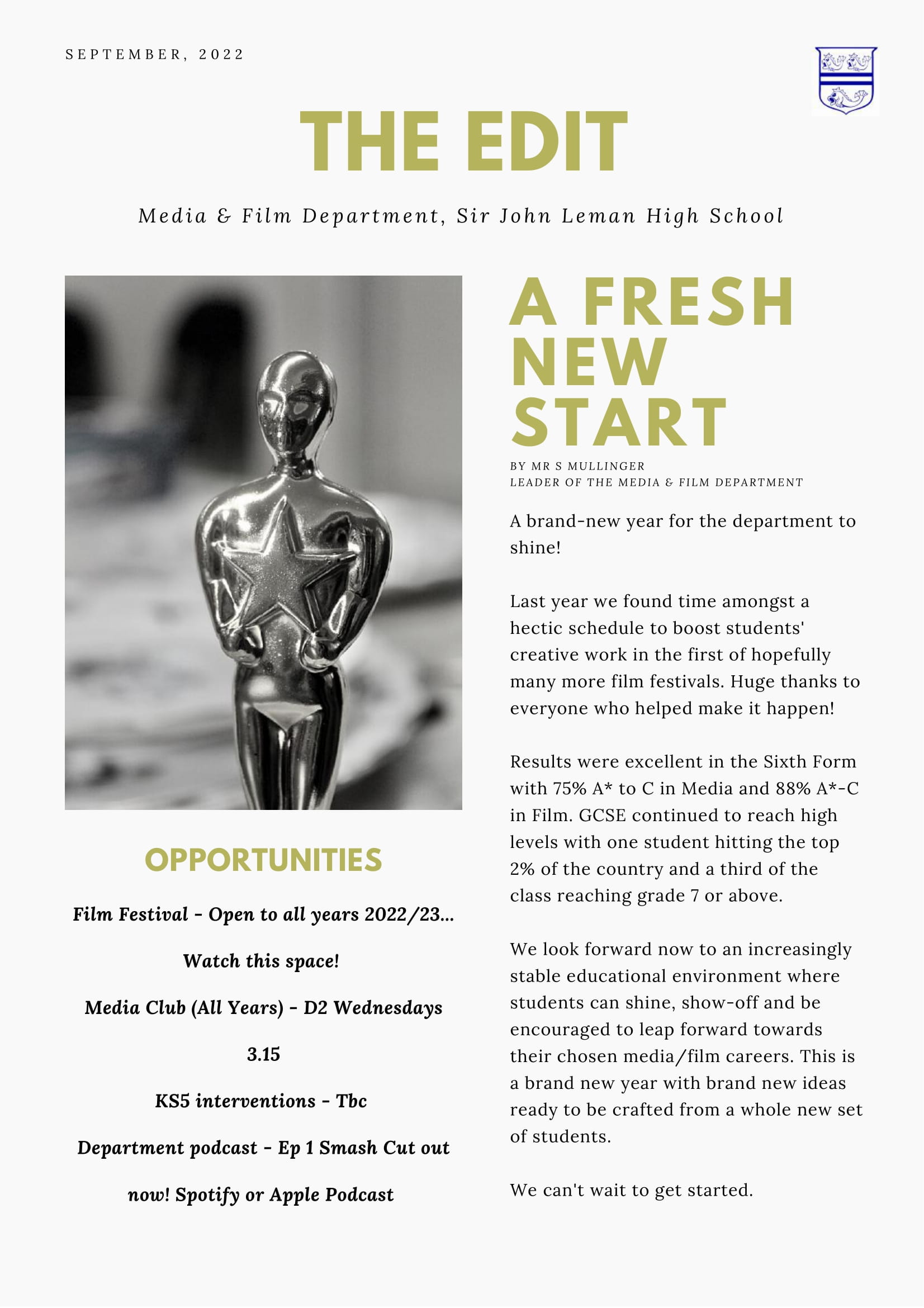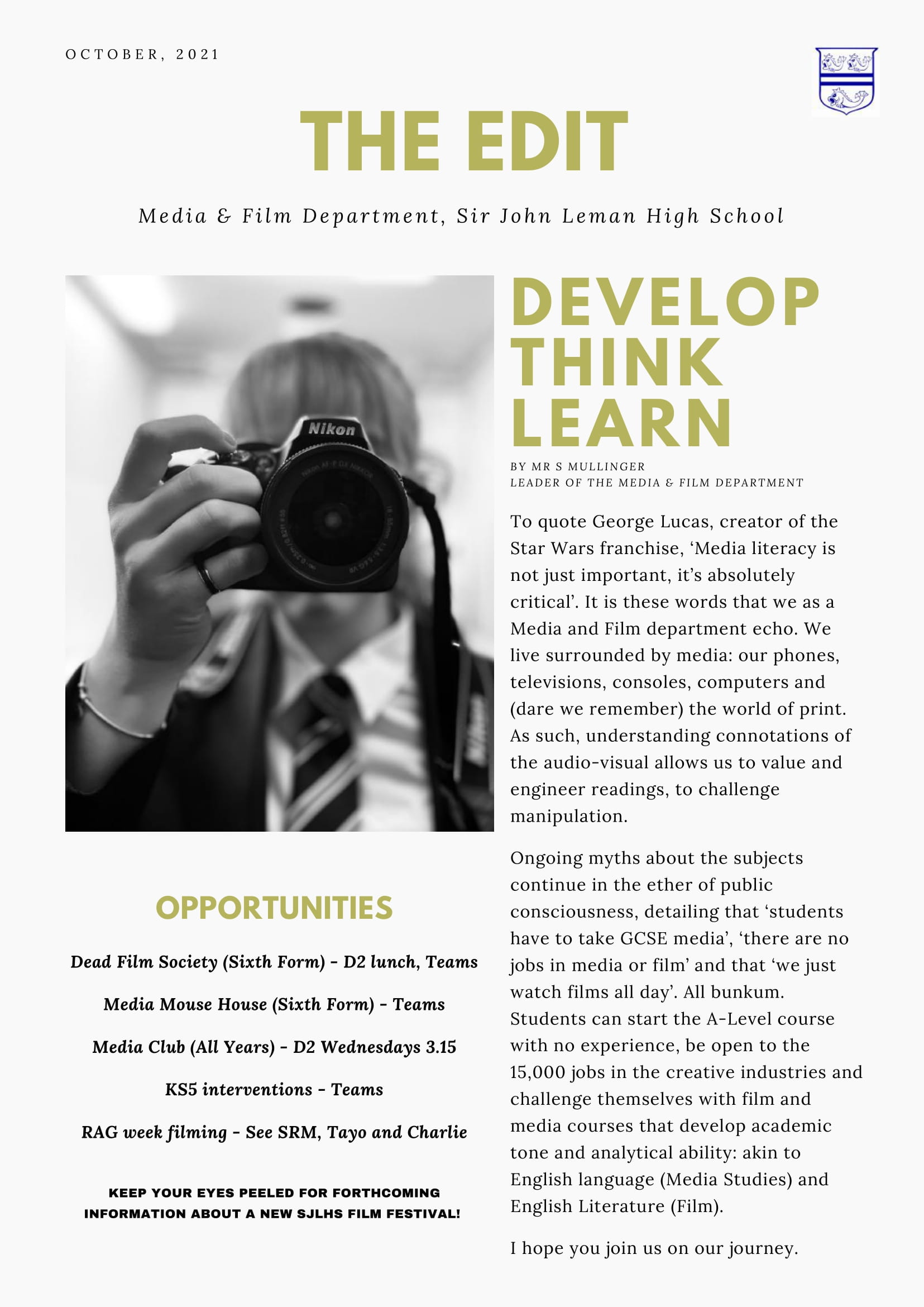Media Studies
Media Studies is a popular GCSE subject choice at Sir John Leman High School. Students in Media Studies investigate modern media platforms including print, e-media and broadcast; exploring the likes of film, television, newspapers and magazines from concept to production. At present Sir John Leman offers students taking GCSE Media a range of media production facilities to create media texts such as short films, wild tracks and magazine designs with an Adobe creative suite within our dedicated Apple Mac room.
KS4
The intent of the Media Studies Curriculum
“Media literacy is a powerful tool with its own vocabulary and grammar that makes an emotional and psychological point to an audience.” Martin Scorsese
The AQA GCSE Media Studies course is a thorough combination of theory and practice. Across the units of study students will:
- learn about media industries worth £2 trillion globally
- study a range of different media such as video games, films, television programmes, newspapers and magazines
- create and design their own media products including websites, short films, magazines and music videos.
Curriculum Sequencing Plan - Media Studies
How is the Media Studies Curriculum implemented?
Students will develop analytical and practical skills. Practical work will make use of the department’s range of equipment from digital cameras to the latest Apple Mac Editing software. Abilities developed in Media Studies will also directly impact on other subjects like English, using transferrable core skills such as:
- textual analysis
- presentational proficiency
- imaginative and creative ideation.
One hour of extended learning will be set over the two week timetable with tasks ranging from analysis of the sorts of varied Media texts studied in school, to research, consolidating portfolios or extension tasks appropriate to individuals’ needs.
The impact of the Media Studies Curriculum at the end of Key Stage 4
How is it examined?
The qualification is assessed by two written exams at the end of the two years demonstrating the development of analysis of media products. There will be one Non-Exam Assessment creating a practical media product.
How important is the Non-Exam Assessment (NEA)?
The NEA represents 30% of the overall qualification and allows students to express their passions for the practical elements of the course. Needless to say attendance is very important to gain the best of this qualification.
What qualification will I get? What could it lead to?
- AQA Level 1/Level 2 GCSE (9-1) in Media Studies
Students looking to progress will find Media Studies of great benefit to access Media and Film at A-Level in the 6 Form; potentially moving towards more specialist qualifications or employment.
Career directions could include:
Future career paths from Media Studies include Audio-Visual and Print Journalism, Film Production in all areas, Online and Video Game Design and Advertising. Students with interest in these areas for their future should certainly consider Media Studies to start their journey into this extensive and exciting environment.
The Edit Newsletter
The Edit newsletter is intended to keep you in touch with what’s going on in the Media and Film Department at Sir John Leman High School- it’s also a great way to celebrate our fabulous students. We’re really excited to be able to represent all the amazing aspects of our department and we can’t wait to see how this newsletter will grow.
KS5
Media Studies – A-Level Qualification
Examining Body:
AQA
Entry Criteria:
Level 3 Sixth Form entry requirements
Course Leader:
Mr S Mullinger
Why? :
Media skills and knowledge can be used in careers such as journalism, game design, advertising and broadcasting. This course is for creative and practical people who are seeking to stretch their abilities through the application of research and academic knowledge. Prospective students should be open to experiencing forms of media outside their usual habits and should expect to become active rather than passive media consumers. Self-motivation, problem solving, determination and a willingness to develop organisational skills are essential throughout the course.
Course Structure:
Students are taught how to analyse media texts through the application of the theoretical framework (Industry, Audiences, Representations and Media Languages) and critical debate. Students are also introduced to the production processes, involved in different media platforms (Online, Audio-Visual and Print). Students will be required to have an investigative mind-set to build up their awareness of media issues and debates. A deep level of academic theory will be explored, advancing the students audio-visual literacy. Beyond this, students will be expected to critically investigate chosen close study products (CSP’s) set by the exam board, advancing their research skills and preparing them for higher levels of education. The Non-Exam Assessment (NEA) component provides students with the opportunity to create near professional, fully realised, audiovisual, print or online products that have a clear justification within the media world. The NEA will be based on a pre-set brief set by the exam board and will be worth 30% of the whole A Level in Media Studies. Investigations into culturally and historically close study products throughout the two years will culminate in two written examinations. The exam will take the form of short answer and extended response questions which will concentrate on the theoretical frameworks exploring issues surrounding the close study products. Students will comment on the cross-cultural factors and the contexts in which the media products were created. The exams will be worth 70% of the whole A Level in Media Studies.
Extended Learning:
There will be regular practical and analytical tasks to complete outside of lessons. Students are also expected to keep themselves up to date with contemporary media issues and debates.








